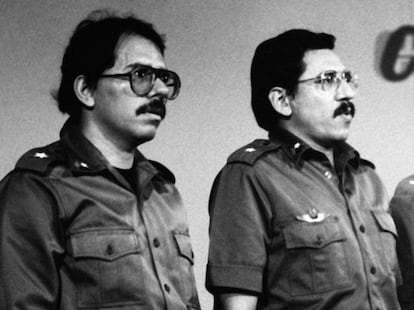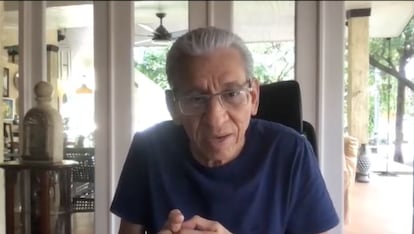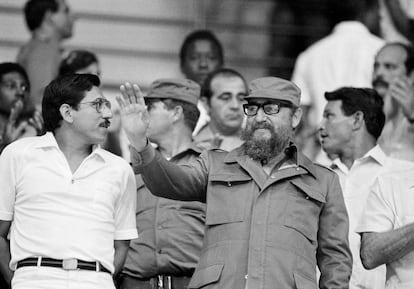Humberto Ortega, a thorn in the side of the Ortega-Murillo regime
The retired Sandinista general and brother of President Daniel Ortega has again launched criticism of the authoritarian Nicaraguan administration and questioned its ability to establish a succession based around the figure of the ‘co-president’


Around 9 p.m. on Sunday, May 19, a police contingent surrounded the house of the former head of the Nicaraguan Army, retired General Humberto Ortega Saavedra. Or, in other words, the brother of Sandinista President Daniel Ortega and brother-in-law of Vice-President Rosario Murillo. The officers who broke into the house stripped the former soldier of his cell phones and computers and ordered him to attend a summons Monday at the National Police headquarters. “He is not under arrest, nor under house arrest, but he must communicate any movement he is going to make,” the police said of Ortega, considered a person of great influence among the Nicaraguan military and the Sandinista ranks.
The newspaper La Prensa confirmed the police operation against Ortega Saavedra hours after the Infobae website published an interview with the retired general, conducted by the well-known Nicaraguan journalist Fabián Medina, who is exiled in Costa Rica. In the interview, Ortega Saavedra strongly criticized the administration of his brother and sister-in-law, especially regarding a particularly sensitive issue for the presidential couple: the dynastic succession they are trying to set in motion, propping up one of their sons, the tenor Laureano Ortega Murillo, as dauphin.
“Daniel Ortega is 78 years old. Could his death create a power vacuum in Nicaragua or do you see the dynastic succession being activated?” Medina asked the former military chief. To which Ortega Saavedra replied: “When there is an authoritarian, dictatorial type of power such as the current one, which depends a lot on the figure of a leader who holds the presidency, in his absence it is very difficult for there to be a continuity of the immediate power group.”
The retired general believes that the reason for this impossibility of continuity responds to “the same authoritarian, personalist, vertical tendency to command, which has castrated the transmission belts of the party.” “The party currently has no replacement. They are there not because of a mystique, but because they are there as officials, many wanting to do well, but more than anything else, gaining benefits from that governmental and political participation. If Daniel Ortega is missing, for me, Humberto Ortega, there is no possibility that anyone from that power group can exercise influence in a process,” he said.

“Without Daniel there is no one”
Expanding on the subject, Medina asked specifically about Rosario Murillo, a figure who has managed to cement so much power in the Sandinista apparatus that her husband named her de facto “co-president” of Nicaragua. Murillo governs with Ortega and there is no one in the regime with more power than her, to the point that she controls institutions such as the National Police and the Judiciary, bodies that were previously under the total influence of her husband.
“Nobody. Nobody,” said the retired general when the name of his sister-in-law, with whom he has historically maintained a tense relationship, was mentioned. “I don’t want to mention anyone in particular. Without Daniel there is no one, because, with everything, Daniel is the only leader, historically, who still retains the credits of that struggle [the Nicaraguan Revolution]. Without Daniel, I see it as being very difficult that there could be two or three that would come together. Much less one in particular, and more difficult still within the family. Sons who have not had the accumulated experience of a political struggle,” Ortega Saavedra said, referring to his nephew Laureano.
And he continued: “Not even [the dictator Anastasio] Somoza could establish his son. With Daniel’s absence, it would be very fragile to sustain all that up to now he has managed to with great effort and enormous complexities. Not only internally, but also with the allied forces of the left and the governments of the region. The only one they know is Daniel.”
As has been the case in other interviews, Ortega Saavedra minimized the figure of his sister-in-law. In this case, he expressed doubts that the “co-president” could catalyze an eventual transition process. In an interview with EL PAÍS in March 2023, the former military officer maintained that “Murillo has the weight that Daniel Ortega wants to give her.” “Publicly he has said — although it is not constitutional — that for him she is co-president. He is saying that he and she are in charge. We don’t have to do much research,” he said. “I think it would be very difficult, very complex. He gives her all the strength and that’s his right, but I see it very difficult to think of a situation with her alone at the head.”
Sandinista sources consulted for this article assured EL PAÍS that it was Murillo who gave the order for the police to move against her brother-in-law. For his part, Manuel Orozco, researcher at the Inter-American Dialogue think tank, indicated to this newspaper that sending police to Ortega Saavedra’s house was a response from the “co-president.”
“First, she understood perfectly well the message that Humberto Ortega gave in his interview to Infobae, basically saying that after the death of his brother, if you want a democratic transition, the opportunity presents itself to set up free and objective elections... But the response she gave was not simply annoyance but basically to say that here, I am in charge. And you do what I say. This is the culture of fear that they impose in the country,” said Orozco.

“A political competitor”
Dora María Téllez, “Commander Two,” a legendary former Sandinista guerrilla and political exile, told EL PAÍS that the relationship between the “co-president” and her brother-in-law was never good, but that it became even more strained as she gained power. “However, I don’t think at the end of the day it has that much to do with personal animosity, but rather it is a matter of political competition,” she said.
“Ortega and Murillo see in Humberto a competitor, someone annoying, who does not submit to their control, who is not subject to them,” says Téllez. “He can say anything, as he has done. So this siege against Humberto — the same siege as against thousands of Nicaraguans — is to silence him. Humberto is a voice outside the country that has gotten out of hand,” adds the former guerrilla. “All that Humberto says, which seems obvious, to the ears of Rosario, Daniel and the family is a big thing... they are thinking that the Sandinista militancy, the public employees, and their adversaries are listening to it. That weakens them profoundly.”
Although Ortega Saavedra has always held a lot of weight in the army and the party, he has nevertheless distanced himself from the authoritarian drift of his brother’s government. Although in his positions he does, in a certain way, justify some of the repressive actions of the Sandinista leader. “The Ortega brothers are not antagonistic, but they have different visions of how to administer power. He says he is not an enemy of the Nicaraguan regime or of the opposition, ‘although I have conflicting points of view with them,’” concludes Medina in the interview.
In the interview, Ortega Saavedra said that being the president’s brother does not afford him protection. “The fact that we are blood brothers does not mean that this group led by Daniel has not had, and still has, enormous discomfort with a man like me. There have been some who have even thought of eliminating me. I have never heard it from Daniel, but I have heard it from people who are with him. I know. I know that they can poison you, that they can let a van go on the road... Those things can happen.”
Sign up for our weekly newsletter to get more English-language news coverage from EL PAÍS USA Edition
Tu suscripción se está usando en otro dispositivo
¿Quieres añadir otro usuario a tu suscripción?
Si continúas leyendo en este dispositivo, no se podrá leer en el otro.
FlechaTu suscripción se está usando en otro dispositivo y solo puedes acceder a EL PAÍS desde un dispositivo a la vez.
Si quieres compartir tu cuenta, cambia tu suscripción a la modalidad Premium, así podrás añadir otro usuario. Cada uno accederá con su propia cuenta de email, lo que os permitirá personalizar vuestra experiencia en EL PAÍS.
¿Tienes una suscripción de empresa? Accede aquí para contratar más cuentas.
En el caso de no saber quién está usando tu cuenta, te recomendamos cambiar tu contraseña aquí.
Si decides continuar compartiendo tu cuenta, este mensaje se mostrará en tu dispositivo y en el de la otra persona que está usando tu cuenta de forma indefinida, afectando a tu experiencia de lectura. Puedes consultar aquí los términos y condiciones de la suscripción digital.








































